LONDON — A Tory leadership hopeful held clandestine talks with media mogul Rupert Murdoch within days of joining the U.K. Cabinet, then failed to declare it in transparency data.
Business and Trade Secretary Kemi Badenoch, the bookmakers’ favorite to become the next Conservative Party leader, met privately with Murdoch and other News Corp executives in New York in September 2022.
Murdoch, who stepped down this month as chairman of Fox and News Corp but retains a hugely powerful role at the media empire, questioned Badenoch for 20 minutes in an atmosphere described as akin to a job interview by one of those in attendance.
An official briefed on the meeting said a nervous Badenoch — who had not expected Murdoch himself to be in attendance — asked her aides afterward: “How did I do?”
The encounter was never recorded in Badenoch’s public log of ministerial meetings.
The U.K. government’s ministerial code of conduct clearly states that “meetings with newspaper and other media proprietors, editors and senior executives will be published on a quarterly basis, regardless of the purpose of the meeting.”
When contacted by POLITICO, a government spokesperson described the failure to publicize the meeting with Murdoch an as “oversight” by officials.
“There has been an oversight from the then-Department for International Trade. The relevant meeting transparency returns were not submitted for the Secretary of State for September 2022. This will be corrected when the department submits the next transparency return,” a Department for Business and Trade spokesperson said.
“The Secretary of State had a scheduled meeting with News Corp in New York, as part of her programme at the Atlantic Future Forum.”
The pairs paths have crossed again at least once, when Badenoch joined other members of the Cabinet at a party hosted by the media mogul in London this summer. “Rupert loves Kemi,” a News UK insider said.
However, no further transparency data has been published by Badenoch’s department since March 2023.
Daniel Bruce, Transparency International U.K.’s chief executive, criticized the appearance of “cozy fireside chats” between politicians and media proprietors.

“The public should be able to see who is bending the ear of our politicians, especially if they are associated with the media,” Bruce said.
“In order to assuage suspicion that our policymakers are being influenced by private interests, ministers should, at the very least, fulfil their transparency obligations and openly disclose who they are meeting.”
Murdoch has a decades-long history of cultivating personal relationships with top politicians in the U.K., the U.S. and Australia.
Former Labour Prime Minister Tony Blair successfully courted the endorsement of Murdoch’s British newspapers in the lead up to the 1997 election, which Labour won. Murdoch switched his media empire’s allegiances back to the Conservative Party in 2009 after heavy lobbying from then-party leader David Cameron, who became PM the following year.
Writer Michael Wolff, who has written two books on Murdoch, told POLITICO’s Power Play podcast last week that Murdoch sees himself as someone who can “make politicians” and “break politicians” at will.
“Rupert is a cultivator and curator of political talent and he likes a certain kind of politician. He likes a buttoned down, conservative, responsible, economically business-oriented — all of that kind of thing,” Wolff said.
Badenoch rose to prominence during the July 2022 Conservative leadership contest, where she became popular among the grassroots membership for her stance against “woke” issues, such as the proliferation of transgender bathrooms and the teaching of “critical race theory” in schools.
She was rewarded with Cabinet positions by first Liz Truss and then Rishi Sunak, after finishing fourth in the Conservative Party leadership contest.
Recent polling from ConservativeHome revealed Badenoch is the most popular Conservative Cabinet member among the party’s membership, who will choose the next leader when Sunak steps down. He is expected to do so should the Tories fail to win the next election, expected by late 2024.




